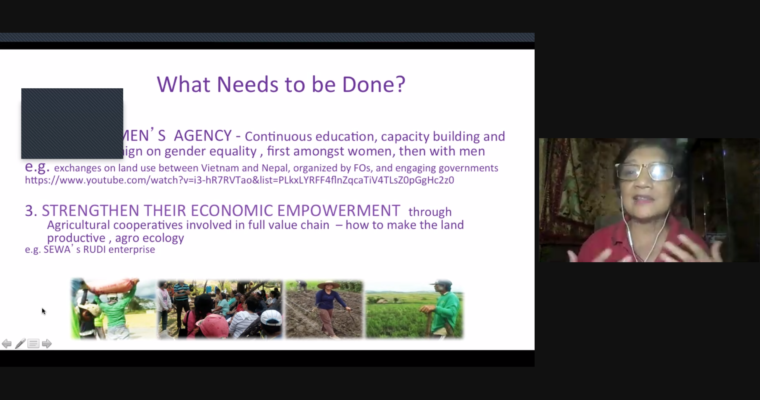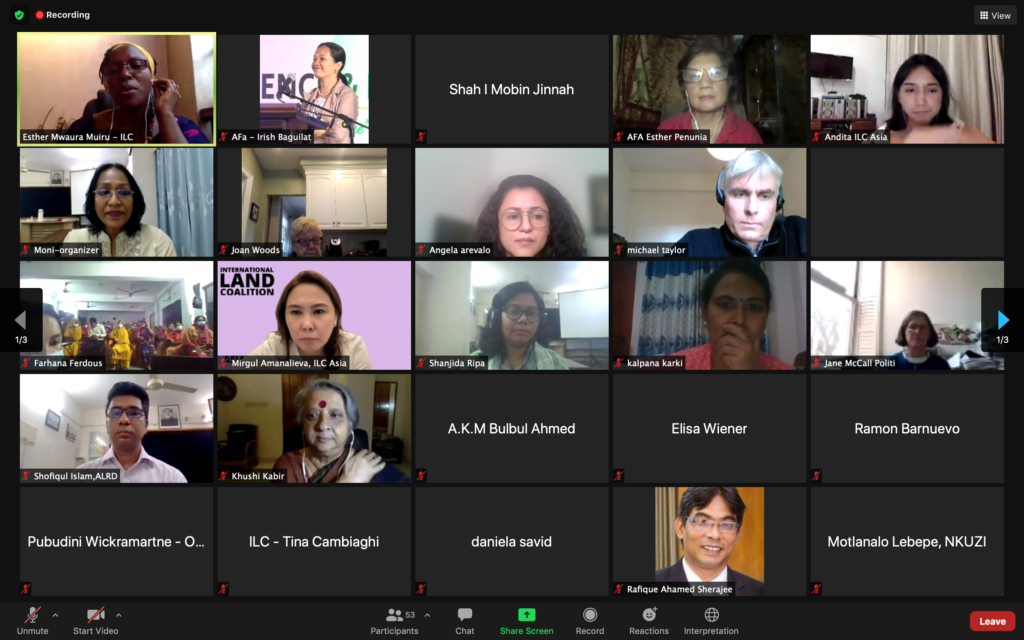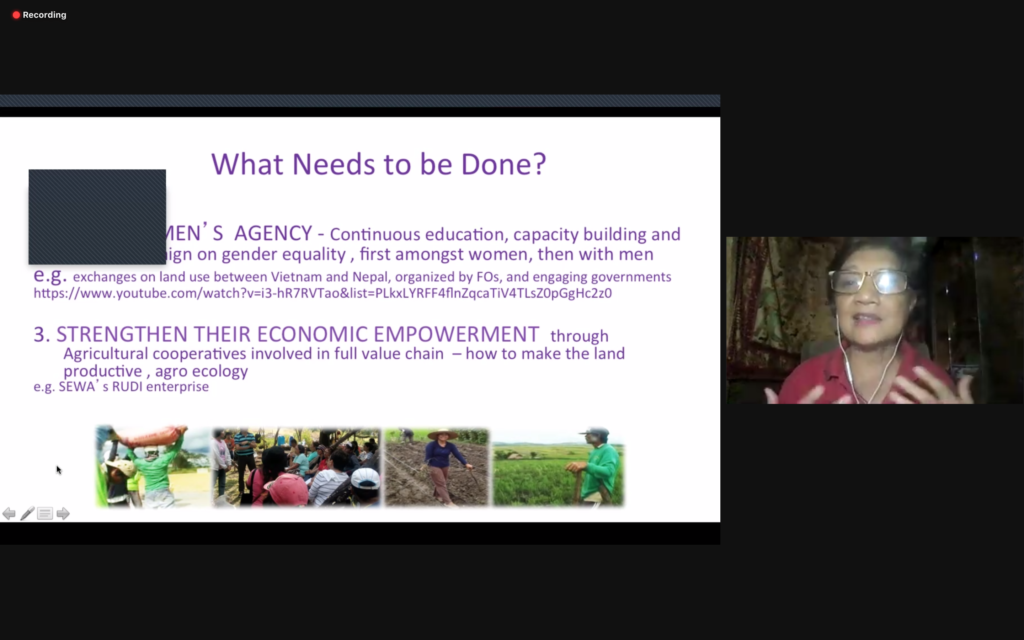It can be said that a woman farmer is an embodiment of the nexus of agriculture, health, nutrition, water, and energy. And that to succeed as a farmer and in family life in general, one needs land – to grow food, to build a house, to grow herbal plants, to get water, and to get firewood. These are some of the key messages that AFA Secretary-General, Ma. Estrella “Esther” Penunia, underscored during the virtual forum on March 22, 2021, entitled “Land-based Empowerment of Women and Achieving Sustainable Development Goals”. Ms. Penunia was among the seven speakers in the event that was organized by the Association for Land Reform and Development (ALRD) together with the International Land Coalition (ILC), Stand 4 Her Land (S4HL) Campaign, Global Land Tool Network (GLTN) and Oxfam International. It aimed at building a broader coalition on women’s land rights to advocate through the Generation Equality agenda.
Food systems transformation is fundamental to address sustainability issues that countries of the world are facing. To transform the food systems and at the same time increase production to feed a growing population, securing land rights for women is fundamental. The Food and Agriculture Organization (FAO) affirmed that by empowering women farmers, the overall productivity of the agriculture sector can increase by 20-30 percent more. Empowerment of women in rural areas means they have access to and control over land and other productive resources, education and training, technology, market information, financial assets, and services. Thus, advocates for gender equality continue to underscore the need to address land rights issues and inequality in agriculture to achieve the 2030 Agenda commitments. The organizers of the event stressed that out of the 169 targets, nine are on land, and 12 out of the 240 indicators have direct relevance to gender equality and insecurity of land tenure. Moreover, five out of the 17 Goals make clear references to women’s land rights. Thus, addressing gender inequality will impact SDG outcomes.
In her intervention, Ms. Penunia started by saying that in developing countries, 35 percent to as much as 80 percent of people rely on agriculture for a living, with half of them being women. At the outset, it is important to recognize that women farmers have multiple roles and contributions at the household level. These include reproduction functions, caregiving, food production, marketing of their products, and as frontline service providers in the areas of education, health, nutrition, and agriculture extension.
She further pointed out that land is an economic asset where one can decide what to plant, how to plant, how to use farm products, or where to sell, and one can freely use the products as well as other resources on the land or under the land. Land can also serve as collateral for loans or one can sell it should one need money. The land has also become a requirement to be identified as a farmer to receive the government’s agriculture services and extension. Ms. Penunia stated the reality that there is landlessness even amongst farmers, and within the family farming sector, and that women are more landless than men. About 10-20% of women farmers own lands. The land is key to the empowerment of family farmers, of women farmers.
On what needs to be done to promote land rights for women, she started with a video of a family in the Philippines who is an agrarian reform beneficiary. Philippines’ agrarian reform program includes the name of the husband and the wife in the certificate of land ownership award. The video can be accessed here: https://www.youtube.com/watch?v=9QnKeCs_yrA
She further affirmed that land rights improve women’s situation in the family and the community as shown in the story of Belen and her family. Access to land can help women diversify the household’s income and food source through home gardens, raising of poultry, hogs, or other income-generating activities. The formal land title enables women to access services and more importantly it empowers women to assert themselves better in their societies.
Finally, Ms. Penunia, identified five points on what needs to be done and shared several AFA’s initiatives along these lines:
- Organizing, federating, and solidarity building at the local, national, regional, and global levels along Pillar 3 of the Global Action Plan of UNDFF. AFA member in India, Self Employed Women Association (SEWA) with 2 million members from the informal sector including women farmers, hosted the Asia Pacific Women Farmers Forum in 2017, where AFA brought women leaders from 13 countries to start an Asia Pacific Women Farmers Forum. In the sharing session on the challenges and successes, it was affirmed that there is strength in united voices, united demands, and united calls.
- Build women’s agency through education, capacity building, and public campaign on gender equality first amongst women, then with men. One example is the exchange that was organized on land use between Vietnam and Nepal, which was organized by farmers organizations, and government engagements. https://www.youtube.com/watch?v=i3-hR7RVTao&list=PLkxLYRFF4flnZqcaTiV4TLsZ0pGgHc2z0
- Strengthen women’s economic empowerment through sustainable agriculture such as Agroecology that improves soil health and productivity, and agricultural cooperatives that are fully engaged in the value chain. One example is SEWA’s RUDI enterprise (http://sewarudi.com/ )
- Policy advocacy to strengthen women’s ownership, access, and control over the land are supported by evidence. One example is the Joint Land Titling in the Philippines, Vietnam, and Nepal.
- Strengthen partnerships and collaboration with the following:
- Government to claim to make for land rights and support services – infrastructure and equipment, capital, and loans.
- NGOs to access support for women organizing & leadership development, Agri-Coop formation; entrepreneurial and management training, full value chain services from production to marketing needs.
- Business sector to tap the market for farmers’ products and as business partners through fair contract growing and purchase orders, etc.
- Development partners/funding Agencies to advocate for funding for women empowerment, building women’s agency, and support to securing their rights to lands and making their lands productive.
Other speakers were Khusi Kabir of Association for Land Reform and Development, Pubudini Wickramaratne of Land Rights Advocacy Lead at Oxfam International, Motlanalo Lebepe of Nduzi Development Association, Mino Ramaroson of Huairou Commission, Daniela Savid of Fundacion Plurales Argentina, and Michael Taylor of the International Land Coalition. The event was moderated by Esther Muiru of the International Land Coalition.






Comments are closed